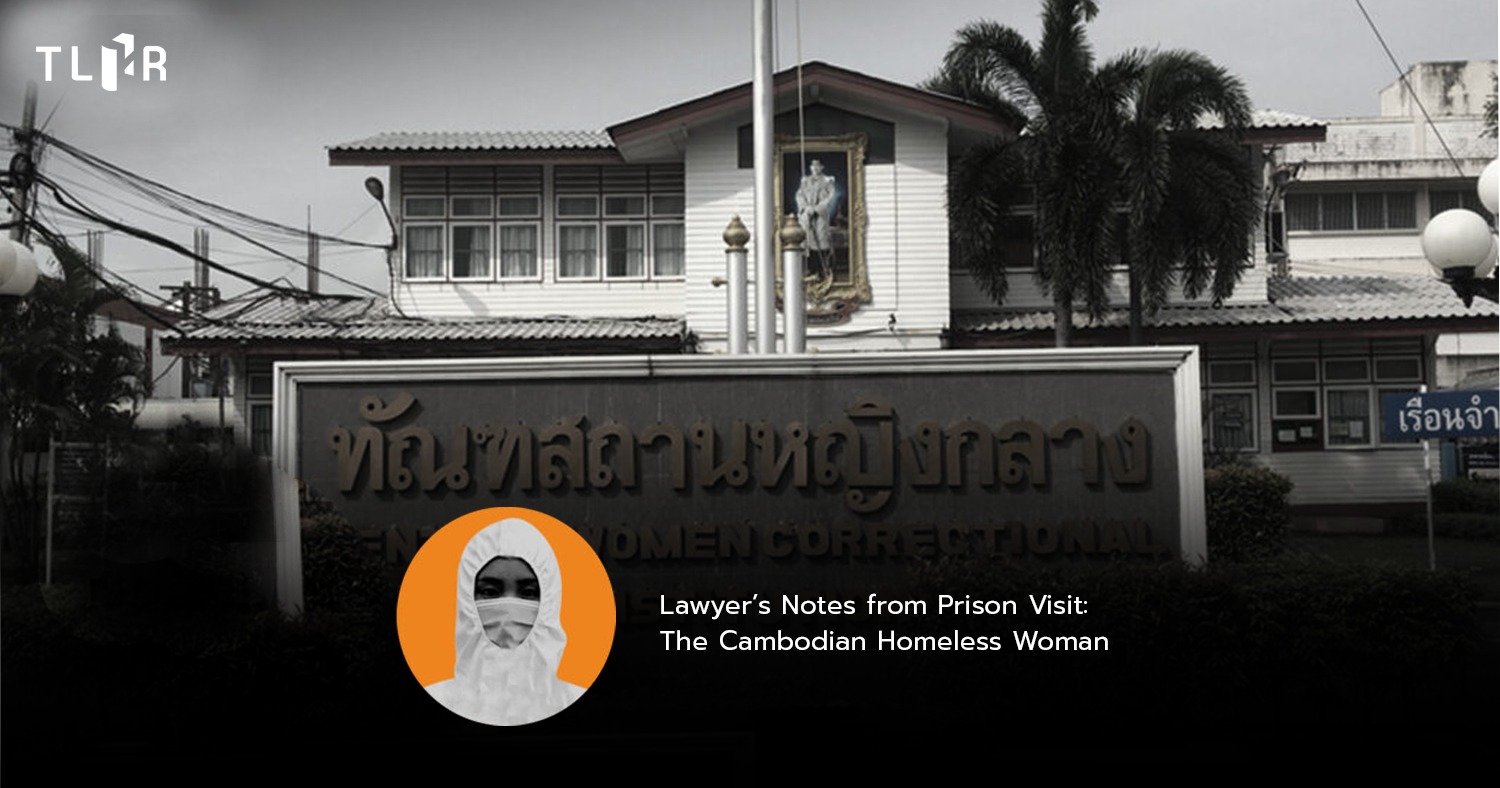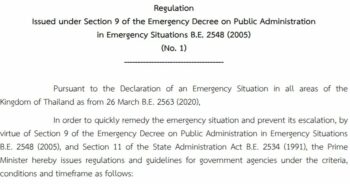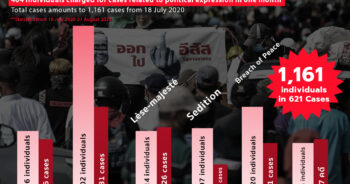On 17 September 2021, lawyer travelled to the Central Women’s Correctional Institution to visit “Mrs. Huad” (alias), a 53-year-old homeless woman of Cambodian nationality who was arrested at the 11 September protest in Din Daeng. She insisted that she merely came out to find food, and not to take part in the protest.
On the night of 11 September 2021, the riot control police made a mass arrest of 77 citizens, protestors, and those found in the Din Daeng Intersection area. Among this number were at least 43 people who were not partaking in the protest that day, including Mrs. Huad.
After being seized by the riot control police in Pratunam area, Mrs. Huad was taken to the Din Daeng Police Station to file an arrest record and hear the charge. She was kept in the same room at the police station for one night together with the others arrested from the same event, as it was a public holiday and the inquiry officer could not take them to seek detention from the court. On Monday, 13 September 2021, the inquiry officer submitted a detention request for her and all the others to the Criminal Court, who then allowed bail for all except her and Chai (alias), an unregistered Thai-Cambodian man, reasoning that
“they have no personal identification documents. If they are released temporarily, it is reasonable to believe that the two accused may attempt to flee.”
She was moved from the Din Daeng Police Station to the Central Women’s Correctional Institution on the same day and has been staying there ever since. Chai was later granted bail, after the second attempt by the lawyer. Thus, as of now (18 September), Mrs. Huad is the only person among the 11 September protest cases who is still behind bars and does not receive bail during the investigation process.
Yesterday, the lawyer contacted the officers at the Central Women’s Correctional Institution at around 1 pm to request a visit with Mrs. Huad for the first time. Initially, the officers rejected her request claiming the 21-day quarantine measure for new prisoners during the Covid-19 pandemic. The officers informed the lawyer that they could only help bring the power of attorney form for Mrs. Huad to sign and bring it back.
The lawyer, however, insisted that she wished to meet with Mrs. Huad via video conference, which was possible despite the quarantine, so that Mrs. Huad could consult with the lawyer regarding the limitations due to her status early on into the detention. The visitation thus was the right of the accused to meet the lawyer. The correctional officers then went back to consult with the commander, which took in total more than 3 hours, before eventually permitting the lawyer to meet Mrs. Huad via video conference system. The lawyer noted that 3.30 pm was near the time the prison required prisoners to return to the dorm and be ready for the headcount, and might not be enough for the talk.
The lawyer also brought along a “Cambodian interpreter”, as Mrs. Huad was Cambodian and could only communicate in Khmer. Nevertheless, the prison officers did not allow the interpreter to meet Huad, but insisted that the prison’s interpreter be used instead.
At around 3.30 pm, the officers allowed the lawyer to contact Mrs. Huad in the prison through a video call via Line application. As the lawyer was asked to use her personal mobile phone to call the prison’s phone that was with Mrs. Huad, she discovered that the phone only had 10% battery left.
The lawyer had understood that according to the visitation practice at the prison, the prison would be responsible for providing all necessary equipment and communication system for lawyers, relatives, or other visitors. That said, due to an unexpected circumstance yesterday, the lawyer had no other choice but to use her mobile phone with low battery level for the 10-minute conversation with Mrs. Huad that was allocated by the prison officers.
As the video call began, the lawyer quickly realized that the area had poor connection. Thus, she had to try to identify a spot with the strongest signal within the visitation room.
Finally, Mrs. Huad appeared in a PPE suit covering from head to toe, a surgical mask, and a face shield. Due to the multi-layered protection as well as the technical level of the language, the prison’s interpreter had a great difficulty hearing and translating the conversation between Mrs. Huad and lawyer.
In this regard, the lawyer told us that had the prison allowed her own interpreter to be used, the conversation would have been more time-efficient and concise. This was because the interpreter that she had prepared had work experience in law and good understanding of legal matters.
According to the lawyer’s summary of the problematic conversation,
“Mrs. Huad is Cambodian. She is a homeless person. Prior to the arrest, she was looking for something to eat. She did not intend to participate in the protest that was happening in the area. She is currently an asylum seeker in a foreign country.”
In terms of the litigation process, the lawyer asked whether she had resisted or fought the riot control police during arrest as she was also charged with Section 138 and 140 of the Penal Code for “resisting or obstructing an official by carrying any arms or by having participation of three persons upwards”. To this, Mrs. Huad replied,
“I did not resist or do anything to the police. The police were the only ones who did things to me”.
The lawyer did not have the chance to ask Mrs. Huad to elaborate more on the arrest event and her wellbeing because the phone battery eventually died. The total conversation with Huad lasted no longer than 5 minutes, while it took more than 2 hours and a half for the correctional officers to grant permission and the Central Women’s Correctional Institution to prepare for the visit.




